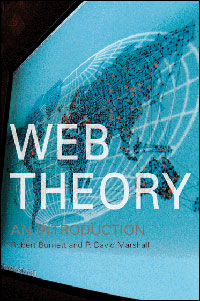
| A Book Review – Web Theory: An Introduction | |
| Editor's Note |
| Linux Security - 1 |
| What is PKI? - 2 |
| Search Engines |
| OpenOffice.org 1.1 - 1 |
| Web Site Usability - 1 |
| A Book Review - Web Theory: An Introduction |
| CISN Archive |
| Questionnaire |
| Send Feedback |
|
"Web Theory" explores the shifts in society, culture and the media which have been brought about by the growth of the World Wide Web. So, the book is a very contemporary reading about the contemporary culture and the web. However, an underdeveloped and/or a developing country reader of the book will have to constantly keep in mind that the Web itself is originated in the Western world and the culture presented in this book is the Western culture.(1) Everything about the web of the West, the rest has to accept. As the title of the book reveals, it provides an introduction to the theoretical discussions about web & society to the newcomers of this field, as well as to the students interested to explore such issues capturing the dynamics of how the intellectual currents of contemporary culture and the Web crosscut each other. Though it is an introduction, Marshall and Burnett build the content first and foremost on the range of critical issues, the main debates and the essential resources, in an organized whole, so it is also recommended reading for any learned person in the field. Another fact about the title of the book is somewhat brave and a little bit sweeping. Since it claims to be a web theory, a reader might rightfully expect to find a broad description of the Web in it. Indeed, the book accomplishes this hard task with a set of chapters, each refined on a subject of interest about web. The reader may start anywhere s/he wants. This book is not confined in the physical rigidity of a conventional book. Many books are commercially presented in most of the sites. However, this book is an interactive one; it promotes itself and connects its readers to its own web site at http://www.webtheory.nu. This attempt of the book is very well associated with the promotional aspects of the web sites mentioned in one chapter. As to give one example to the content of the chapters, one of them delves into inquiries about the concept of any new technology as having the capacity to transform the society. The interesting insights of three theorists, mainly Canadian in origin, are mentioned so as to determine the importance of "technological determinist" perspective, though "limited in applicability", as an approach that will help us to understand Web. Much of the literature of their subject of inquiry is comprised of relatively unfamiliar terminology to the, say, non-familiar people. Such words are "Web/Network society, loose Web, digital communication, technological determinism etc., New Agora, digital divide etc." and are printed in bold to remind us we can eliminate any perplexity by visiting the glossary available at the back. To aid the reader, the authors included specific case studies, summary tables and charts to relate the issues to the main arguments. Web Theory Timetable enables us to examine some aspects in a linear historical continuity. Below are the contents of the book and some related links. Contents:
Identity:
Links: The book is available in the following link at METU library:
The book is available at Bilkent University Library as well and can be searched at the following link:
The web page of the book:
Other review(s) on the book:
(1) It is well-known that significant part of the world is not yet networked. Yet, the book is itself aware of this digital divide and this concept is also included in the glossary at the back of the book. Deniz YÖNTER |
||||||||||||||||||||||||||||||||||||||||||||||||||||||
| - TOP - |
 The book provides a self-explanation on its very first page; Web Theory, it claims, is a comprehensive and critical introduction to the theories of the Internet and the World Wide Web.
The book provides a self-explanation on its very first page; Web Theory, it claims, is a comprehensive and critical introduction to the theories of the Internet and the World Wide Web.